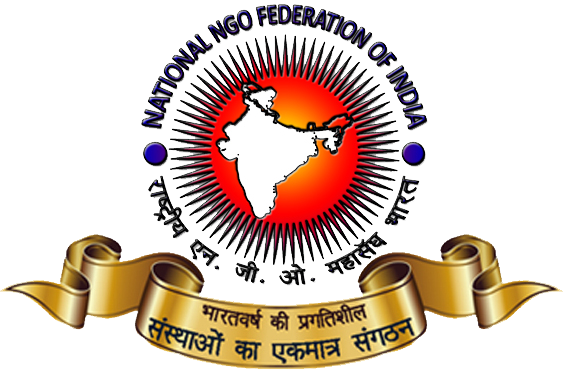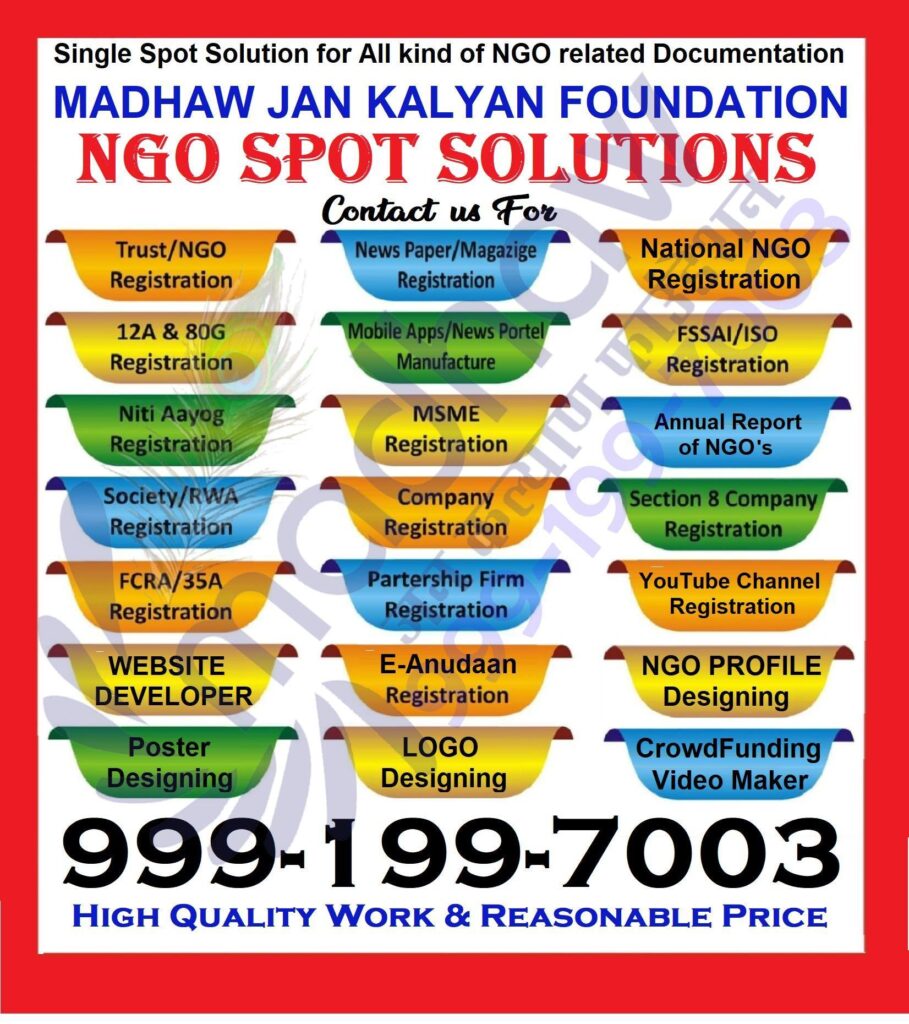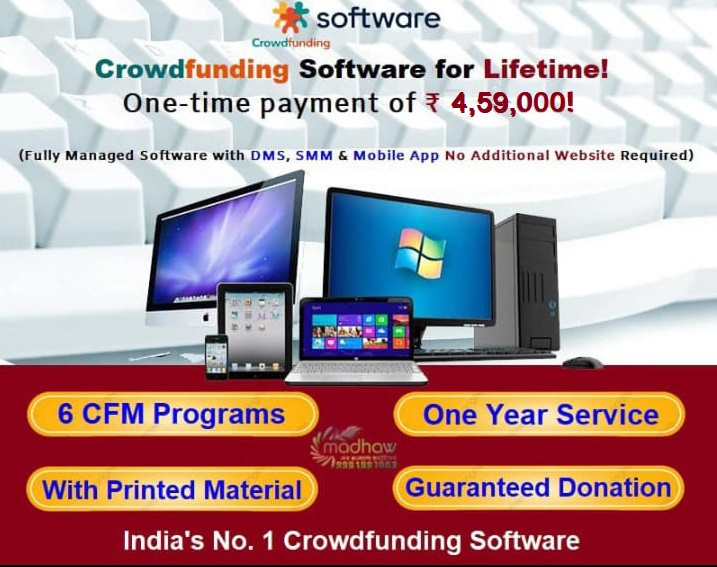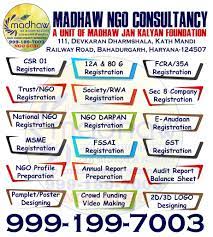NGO Registration
- NGO Registration
- Difference in Company, Society and Trust
- How to Start NGO – Form, Register and Run NGO
- Why to Register NGO
- How to run and manage NGO?
- Society Registration
- Society Registration Process and Procedure
- Name Change Process for Society
- How to Register NGO
- Societies Registration Act, 1860
- Public Charitable trust
- Registration Process of Public Charitable Trust
- After Registering the Public Charitable Trust
- Section 8 Non Profit Company Registration
NGO Resources
- NGO Resources
- NGO & Government of India
- NGO Partnership Registration
- Relations of NGOs with Business and Commerce
- Public Grievances Resolution related to Government
- Social Calendar
- NGO Management
- NGO Support
- What is NGO
- Voluntary Organisations and Volunteerism
- NGOs : Classification, Definitions, Typologies and Networks
- Understanding NGOs
- Can any Government Employee or Officer be the member of NGO?
- Income Exemption u/s 35AC Revoked
- Aims, Objectives & Programmes for NGO
NGO Funding & Grants
- NGO Funding
- Fundraising
- Funding and Grant Schemes
- Govt Schemes
- How to raise Funds for NGO
- Project Proposal Process
- Fundraising Ideas and Concepts
- Funding Agencies
- CSR Funding Empanelment by National CSR Hub
- CSR Funds through Corporate
- CSR Policy, Rules, Regulations and Guidelines of Government
- Government Funding Ministries
- International Funding Agencies
- Google for Nonprofits
- Fellowship
- CSR Funding
- Fund Raising
- Government Funding
- Grant Proposal for NGO Writing Preparation Process
- Project Proposals
Indian Non-Profits
- Andaman Nicobar
- Arunachal Pradesh
- Andhra Pradesh
- Assam
- Bihar
- Chandigarh
- Chhattisgarh
- Dadra Nagar Haveli
- Daman and Diu
- Delhi
- Goa
- Gujarat
- Haryana
- Himachal Pradesh
- Jammu Kashmir
- Jharkhand
- Ladakh
- Karnataka
- Kerala
- Lakshadweep
- Madhya Pradesh
- Maharashtra
- Manipur
- Meghalaya
- Mizoram
- Mumbai
- Nagaland
- Orissa
- Pondicherry
- Punjab
- Rajasthan
- Sikkim
- Tamil Nadu
- Telangana
- Tripura
- Uttar Pradesh
- Uttarakhand
- West Bengal
How to Create Fundraising Culture of NGO

If you want to start a campaign to collect grant for NGO development work with a focus on fundraising then the culture of fundraising is necessary in your team of members and staff. To creating a culture of fundraising is to develop the understanding in team members that fundraising should be integrated into all major aspects of work and structure of the organization. The fundraising staff should not be isolated from plans, program discussions and activities.
The main obstacles to get success in fundraising capability of the NGOs is to mobilize diverse people of the NGO who want to participate in fundraising campaigns. The fundraising Staff and Governing team members have to come for trainings so they can learn about to decide the strategies and improve their skills. The specific handful of people can actually do the work of fundraising. If you select NGO consultants, then they can consult and can make trained to NGO management team members and others to participate in planned fundraising with focusing the requirement to integrate fundraising task and program work.
When you start to raise fund then have to understand the main issues. First is that people’s socially conditioned reluctance to ask for fund; then second is the status credited to program versus fundraising task. NGO staff often have a clear understanding about the issues and the social terrain in that the social organization is functioning. On the other part fundraisers are technicians with skills to carry out specific tasks that have to do with the aims, objectives and mission of the NGO.
As Social Welfare organizations can develop and create not only just fundraising positions but also complete the social development unit. Fundraising should be more professionalized. When the program staff do not want to be part of the social development work team, then the fundraising staff can realize about importance of their role in the fundraising task. Target of fundraising staff can be more than for staff of non-fundraising team.
It is the common issue that how difficult it is to find and associate a good person for fundraising. Well. It is clear that fundraising team members are as doing their work that no other one can do, because they are having the programmatic skills, social service vision and are concerned with the issues that would make their job work more interesting, and prove their work contributions is more powerful. When any organization can include the potential strength to get some valuable input from key persons of staff as well as a process to raise turnover in their Social Development Organization. In that condition the organization can embrace a fundraising culture, in that fundraising and program responsibilities are shared among all staff members and can be integrated with each other in their planning strategy and implementation task.
The following are the parameters NGO can create their culture of fundraising:
1. Regular Fundraising training of staff and NGO general body/board is the necessity to improve and arise greater skills. To help the organizational staff and volunteers can improve the basic skills from the training and can resulted extremely useful. If you provide regular training opportunities in specific areas — such as ask to get donation, organize events or to write effective letters can build more skills among a team members in your NGO.
2. Fundraising and program activities should be different. When you are planning either for fund raising work or social welfare programs, you have to invite input from such people whose primary work is related the other sphere. You have to understand that fundraising is not be relegated to one or a few people in a NGO, but is it to be distributed by team leader for social welfare and development work.
This is a practical approach, as it increases the opportunities for fund that is to be generated and increase the workload among associated people, but it is also a social task, as it recognizes that requesting donors to support your NGO’s work through their financial contributions that is a type of organizing consistency. Donors who donate you fund can also be involved on to take their social participation and action on behalf of the NGO through writing appeal letters, attending fund raising demonstrations, other activities or discussing and promoting your NGO work to their friends, neighbors, relatives and colleagues.
To give opportunities to fundraising staff to share in the program implementation work by actually deciding responsibilities that are traditionally associated with program or by making them as as part of the planning, problem-solving task and evaluation of the completed work that goes on around program implementation.
3. Organize meetings for General body/board and staff to discussing the aspects of funding and attitudes of society about it. It can be started with this concept – What are your earlier financial experiences and the messages you got about collecting money from family members, your community or your institution? Then the NGO supporters can come up with topics they desire to pursue, such as whether grants can be considered uncertain or clean, the role of Income tax exemption and the Government in funding the work we do and so on. Such communications are extremely helpful in supporting by donors and become more forthcoming about grant in general and more comfortable when talking to donors. Greater comfort among board members and staff when speaking about collecting funds will not only give boost to the fundraising drive, but it can also increase their engagement level with each other about issues that affect work of your NGO. This will help to build morale and will in developing a sense of mutual shared involvement spirit.
4. Have to develop specific parameters for the involved team members. Have to avoid the criteria of NGO teams make is to include a fundraising consultant into a training program of the organization teams but not having a drive or project campaign for members to get involved urgently. Discussing NGO members and volunteers about that they have to engage in fund raising tasks but can leave it upto them to figure-out exactly how it doesn’t work as expecting. For people who are reluctant to do anything with fundraising, find normal tasks that aren’t so scaring, like to add personal notes to donation appeal letters or to make thanks calls to donors for their contribution. Later on they can move towards to asking for grant or plan a in another task to collect donation.
5. You have to ensure the representation of your NGO governing executives, volunteers, staff and team members for the fundraising activity you are undertaking and running. Special events can be a type of fundraising activity that often involves volunteer team with members of the organization and others along with staff members to support the campaign. Also have to think about direct mail campaigns and small-scale mobile calling to make a targeted part of the donor list. Main donor campaigns, also can raise more funds if you ensure to involve members on the committee that represent different working areas of social organization.
6. Non-Profit Organization leadership and the governing body directors and the leaders of the NGO need to support the notion that raising donation is a collective and shared responsibility of all members of the NGO. If the leading executive body members believe that the staff of organization are responsible for the fundraising, then other staff can follow that lead. When the Governing body members are performing their role well as expected with their share of fundraising and to encourage and motivate other team members, then it ensures to have much participation from the Governing board as a whole.
7. Have to create an annual pledge for the team members indicate that what they are expecting to do that year in the fundraising area. Additionally you have to specify various programs and activities can be choose such as to join the specific event groups, to participate in contacting through mobile calling or in major donation collection campaigns; you can provide the opportunity to governing board executives about decide the option at their part how they wish to participate. This can often happens more positive result oriented than providing them pre-selected and non-negotiable tasks to carry out.
8. Can use an organized fundraising model to get active participation of people and support. If you have plan to start with a completely resistant group of people of your NGO and staff, then you should not have to recruit everyone for the same cause at same time. You can approach those who looks more open and can utilize them to help convert others to the funding work. Instead of worrying about the people who use to make complain and argue about their limitation to raise fund; you can concentrate on those people who understand well that why their involvement is important and others will eventually follow the same.
9. Have to celebrate the fundraising success campaigns. You have to make sure that donors can be recognized and are to be rewarded for their contributions, even if initially there is no option to show a big amount of money for them.
10. You have to make commitments to create a culture of fundraising in your organization, understanding that it can take some more time. You have to understand that to create and improve the culture of your organization sometimes can take more time and it may not be as easy as someone expecting to change in few time. The main factor behind creating and improving the culture of Fundraising is that what is the vision and thinking status of team leaders and it is also important that how you select the staff and volunteers that are main part of the grant making campaigns, to them you are going to train.



